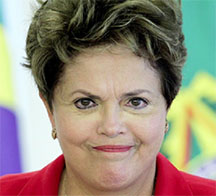(Brasilia) Reuters – Brazilian President Dilma Rousseff’s popularity suffered a new blow in June, with just 10 per cent of voters approving her government as unemployment rises and corruption allegations haunt key allies, a poll showed yesterday.

The proportion of Brazilians who consider Rousseff’s administration “bad” or “very bad” rose to 65 per cent this week from 60 per cent in April, according to a Datafolha poll carried out on Wednesday and Thursday and which was published by newspaper Folha de S Paulo.
Rousseff’s approval rating was the lowest for a Brazilian president since Fernando Collor de Mello’s impeachment in 1992.
Rousseff’s image worsened across age groups and regions, including in poorest socioeconomic groups which benefited most from the policies of Rousseff and her mentor Luiz Inacio Lula da Silva. In the Northeast, a traditional stronghold of Rousseff’s Workers’ Party, only 14 per cent of voters rate her government as “good” or “very good,” compared with 58 per cent who consider the administration “bad” or “very bad.”
The poll was taken before federal police on Friday arrested the chief executives of Brazil’s two largest construction firms for allegedly participating in a corruption scheme that has been linked to Rousseff’s party and Lula himself.
Healthcare, corruption and unemployment are the greatest concerns of Brazilian voters, the poll showed. The share of voters who cited unemployment as their biggest concern rose to 11 per cent, from 6 per cent in April, reflecting the recent increase in joblessness as companies fired more than 200,000 workers in just two months.
Brazil’s economy is probably shrinking at its fastest pace in 25 years, economists said. Despite the downturn, Rousseff’s cabinet raised taxes and increased interest rates in an effort to restore credibility with investors.
Datafolha interviewed 2,840 people in 174 cities.
